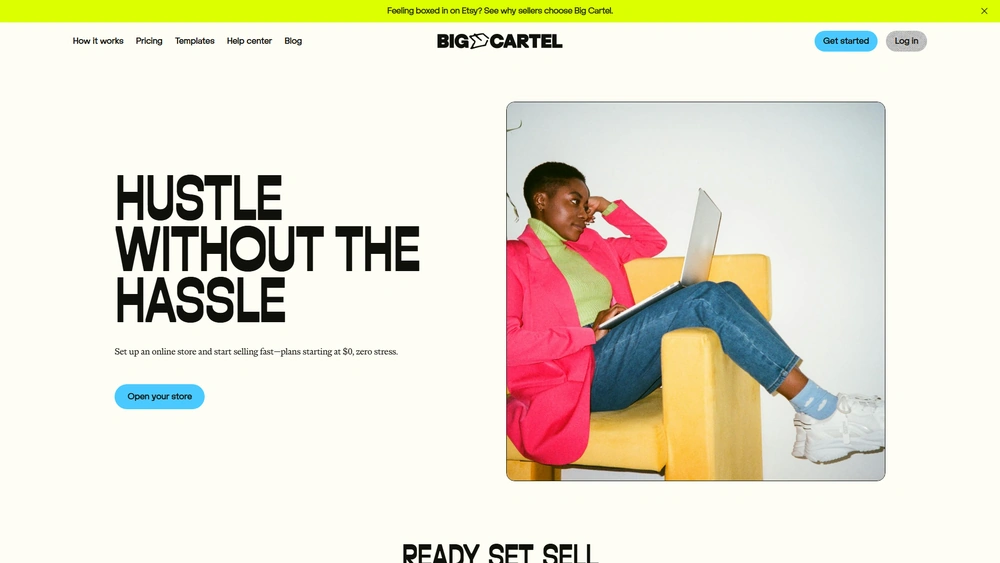Big Cartel Overview & 2026 Industry Position
Big Cartel is a streamlined e-commerce platform tailored for independent artists, creators, and small-shop entrepreneurs. Since its inception, it has carved a niche by offering elegant simplicity and creator-first functionality. In 2026, its relevance persists as more sole proprietors and microbrands reject complex enterprise-level tools in favor of lightweight, affordable solutions. Positioned against giants like Shopify and Wix, Big Cartel appeals to users who prioritize creativity over code—and speed over scale.
From Launch to 2026: Big Cartel’s Journey
Founded in 2005 by Matt Wigham, Big Cartel began as a solution created by a band member for fellow artists needing a basic online storefront. Over the years, Big Cartel championed independent sellers, growing without venture funding and remaining fiercely protective of its creator-driven ethos. Key milestones include:
- 2005: Big Cartel launches as a lightweight platform for musicians and artists
- 2009: Introduces customizable themes and real-time stats
- 2014: Integrates Stripe for streamlined payments
- 2019: Launches built-in discount tools and feature upgrades
- 2022: Adds tier-free pricing for up to 5 products
- 2025: Enhances mobile-first design tools and partner integrations
Big Cartel’s 2025 thesis: Double down on minimalism, creative sovereignty, and free-to-start pricing in the face of increasing complexity in e-commerce software.

Big Cartel Key Features
Big Cartel focuses on ease of use and creative branding without overwhelming its users. Key features in 2026 include:
- No-Code Customization – Choose from responsive themes and tweak with simple settings or custom CSS/HTML
- Free Plan – Manage up to 5 products without paying a cent
- Simplified Checkout – Stripe and PayPal integrations with no transaction fees outside of processor costs
- Mobile App – Full storefront management from your phone
- Real-Time Stats – Track performance at a glance
- Order & Inventory Management – Light yet effective tools for solo sellers
- Sales & Promo Options – Discount codes, limited-time sales, and shipping settings
Workflow & UX
Big Cartel’s user interface is refreshingly simple. From setup to order fulfillment, creators are guided by a linear dashboard without technical jargon. Key UX highlights include:
- Setup wizard for easy onboarding
- Mobile-responsive editor and controls
- Quick product add with variant support (size, color, etc.)
- Clean analytics view focused on essential metrics
Pro Tip: Customize your Big Cartel checkout domain with HTTPS to build trust, especially if selling outside social platforms.
Big Cartel Pricing Analysis & Value Metrics
Accurate as of July 2026, Big Cartel offers three pricing tiers designed to meet the needs of creators at different growth stages:
| Plan | Products | Price (monthly) | Main Features |
|---|---|---|---|
| Free | Up to 5 | $0 | Custom theme, real-time stats, inventory tracking |
| Platinum | Up to 50 | $9.99 | All Free features + bulk editing, Google Analytics |
| Diamond | Up to 500 | $19.99 | All Platinum features + theme code editing, high-volume support |
Value Verdict: Big Cartel is unmatched for creatives seeking a zero-risk entry point and clean scaling up to 500 products.
Competitive Landscape
Here’s how Big Cartel pricing and features compare with popular small-shop platforms:
| Platform | Lowest Tier | Ease of Use | Best For |
|---|---|---|---|
| Big Cartel | Free (5 products) | ✔️ Very Easy | Artists, creators, bands |
| Shopify | $39/mo + fees | ⚠️ Moderate | Growing shops with inventory |
| Squarespace | $23/mo | ✔️ Easy | Design-oriented storefronts |
| Etsy | Fee per transaction | ✔️ Easy | Marketplace exposure |
Common Use Cases
Ideal Big Cartel customers include:
- Artists selling digital or physical prints
- Fashion brands with small-batch SKUs
- Musicians and bands offering merch
- DIY brands plugging into IG/TikTok shops
- Crafters who want full control over their shop without a marketplace cut
Integrations That Matter
Big Cartel integrates with essential tools while keeping the process lean. Key third-party connections include:
- Stripe & PayPal – Easy payments
- Zapier – Automate operations and connect apps
- Printful & other POD – Merch automation
- Mailchimp – Sync store activity for marketing
- Fat Zebra – Australian payments support
Pros & Cons
- Pros:
- Free tier with no credit card required
- Artist-first UX and branding tools
- Fast setup and mobile-friendly backend
- No additional transaction fees
- Cons:
- No built-in blogging or CMS features
- Limited scalability for big catalogs
- Fewer widgets compared to Shopify or Wix
Final Thoughts
Big Cartel creators benefit from focus and freedom. While not built for multi-million SKU stores or complex tax logic, it wins for creators who value clean layouts, flat pricing, and a direct line to their fans. The platform’s core trade-off: maximum simplicity over deep complexity. In 2026, that’s a trade many microbrands are willing to make.
Big Cartel FAQ
Yes, Big Cartel’s Free plan allows up to 5 products and includes key features like real-time stats and customization with no hidden fees.
Shopify is more robust and scalable but more complex. Big Cartel is simpler, more affordable, and best for small catalogs.
Yes, you can connect a custom domain to any Big Cartel paid plan for better branding and professionalism.
Yes, basic tax and shipping settings are included, but advanced tax rules may require external tools.
Yes, Big Cartel supports digital products through integrations like Pulley to manage file delivery securely.


